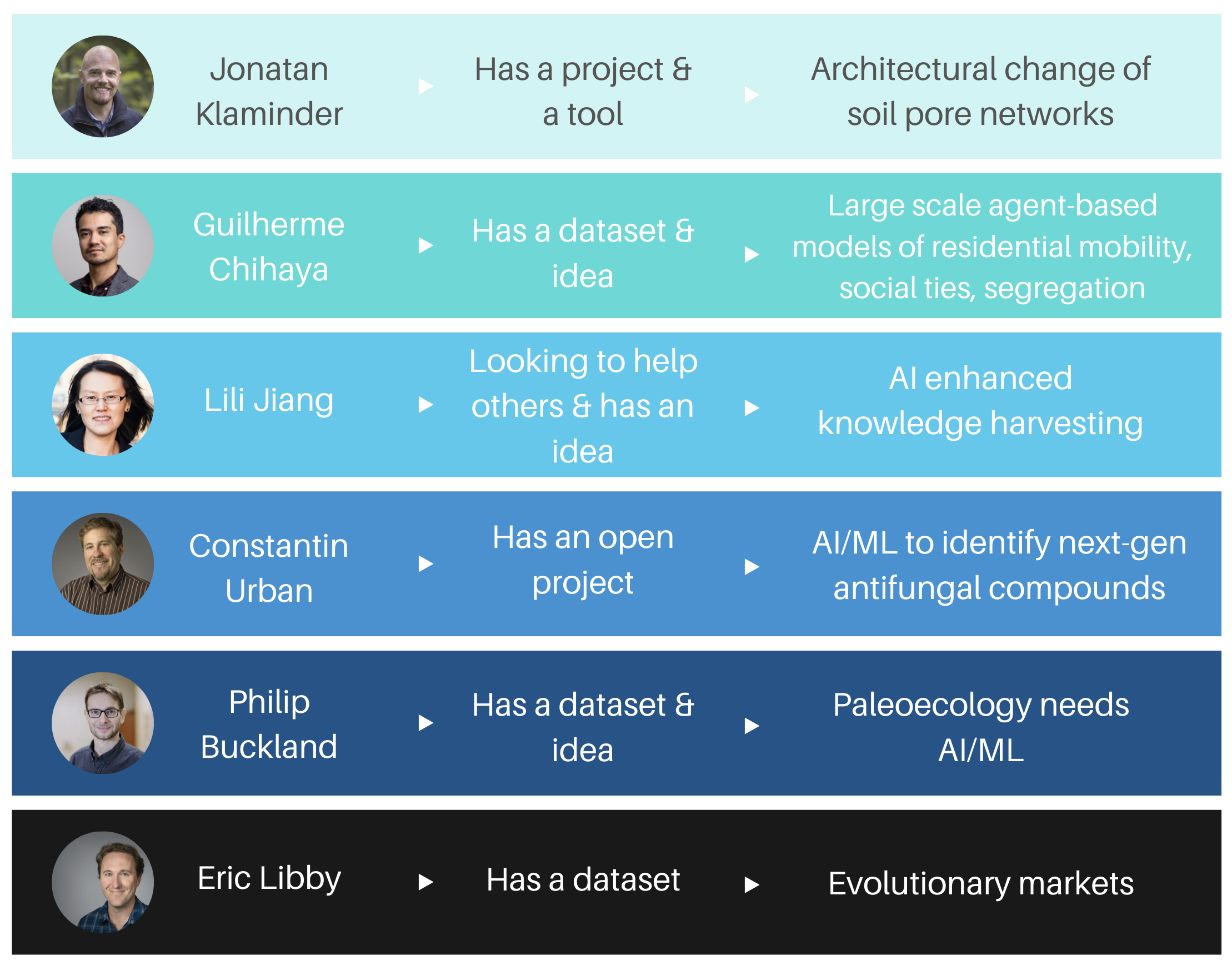IceLab Open Pitches for the IceLab Multidisciplinary Postdoctoral Project Call
April 20, 2021
In this pitch session researchers who had not identified a research partner, either to collaborate on an application for the IceLab multidisciplinary postdoctoral project call, or in general for future collaboration, presented a 5 minute pitch.
We encouraged pitches from researchers who have one or more of the following characteristics:
- They are looking for open problems/questions to create new collaborations.
- They have an open project or idea that they feel could benefit from a collaboration
- They have a dataset and want to see if there is more they can do with it
- They have a research tool or approach and want to find a collaborator with an idea or data to apply it to
Title: Architectural change of soil pore networks and its implications for your children’s children
I have an idea how we could study complex soil networks in way no one have done before. This novel approach will allow us to conduct controlled experiments that can test the validity of a theory of near paradigmatic proportion for environmental science.
I need a partner with experience in network analysis to co-supervise this project.
Title: Palaeoecology needs Artificial Intelligence/Machine Learning
The SEAD database (www.sead.se) includes hundreds of thousands of geochronologically located observations of fossil plants and insects, providinginformation on past biodiversity, and acting as proxies for past environments and climates over 1000’s of years.
We would like to use use AI/ML for 1) pattern recognition/exploratory data analysis of these data and/or 2) build an AI/ML based expert system for teaching and research using these data. Everything created should be openly accessible online (https://browser.sead.se/).
Title: Large scale agent-based computer simulation models of residential mobility, social ties, and segregation.
I work for a research project that uses register-based large-scale data to study how social network ties affect residential mobility and potentially exacerbate residential segregation. Residential mobility and network ties have complex interactions because people make friends where they live and also move to where their friends live. The complexity of the problem makes agent-based computer simulations necessary but the group lacks the needed programming and computer science expertise.
Title: Can we use AI / deep machine learning to identify next-generation antifungal compounds?
Fungal microorganisms are an increasing problem connected to climate change. They cause severe infections in humans, animals and plants. A common feature of many fungal microorganisms is hyphal growth. To To grow as hypha fungi undergo a cellular process called germination. Let us find small molecules which block germination to prevent fungal infections.
Title: AI-Enhanced Knowledge Harvesting via Heterogeneous Data Analytics & Federation
Collaboration interest on applying heterogeneous data analysis to real applications. The expertise from our part may include text mining, data federation, information retrieval, natural language processing, machine learning and privacy preservation. Interested in various data such as public web data (e.g., social network data, news), register data (demographic, municipality, medical data etc), and any other domain specific data.
Title: Evolutionary Markets
I have a dataset of metabolic networks – sets of chemical reactions describing the processes going on inside of a microbe. There could be many possible questions to investigate within that dataset. I am interested in collaborating with someone to study this dataset, particularly in areas like trade in communities, evolutionary stability, and the roles of organisms.
Six researchers pitched for 28+ participants, followed by breakout room discussions
While all six pitches were in completely different research areas, three of them held a common request. They were searching for someone who might have expertise in machine learning or artificial intelligence that might want to collaborate on interesting problems, for example anti-segregation policy in urban planning (Guilherme Chihaya), finding new non-toxic anti-fungal compounds to treat diseases (Constantin Urban), through finding patterns in past climates based on paleodata (Philip Buckland). One pitcher, Lili Jiang, pitched her expertise in machine learning along with many open research interest areas, sparking some interesting conversations with the other pitchers in breakout rooms. Jonatan Klaminder was interested in finding someone with network analysis expertise, especially in fractal scaling, to study the effects of warming on carbon sequestered in arctic soils taking advantage of his research x-raying pores in soil and 3D printing at a 50 µm scale. Eric Libby presented a dataset he has been collecting with real microbial metabolic networks, seeking a collaborator to think of interesting questions to investigate using the dataset, for example on the subject of trade in communities. If any of these subjects spark an interest, the pitchers can be contacted to chat more on the subjects touched on here.

